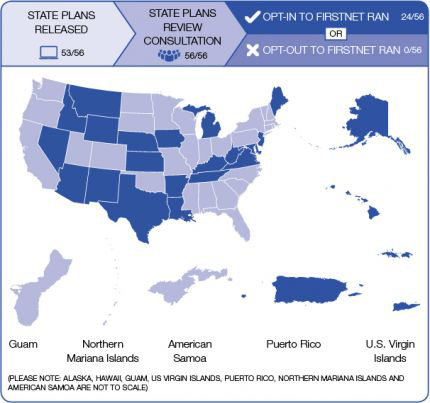Louisiana, Texas, and Idaho have opted in to use the FirstNet radio access network (RAN) to provide broadband communications to their public safety communities, taking the number of states and territories to do so to 24.
First respnders in states that have opted-in will have immediate access to quality of service and priority to voice and data across the existing nationwide AT&T LTE network. In addition, preemption for primary users over the AT&T LTE network is expected by year-end.

FirstNet has met with Texas public safety officials including the Texas Interoperable Communications Coalition and the Texas Department of Public Safety to address specific safety needs across the state, including:
- Expanded coverage and coordination with deployable solutions and additional investments beyond what is currently available from commercial carriers with a focus on underserved public schools, hospitals, public safety answering points, the Texas-Mexico border, tribal areas and hurricane evacuation routes.
- Using the investment, innovation, best practices and lessons learned from the Texas Early Builder Program in Harris County to inform how the network can support response and recovery activities during disasters and large events while also informing the development of intuitive service solutions that will meet the expectations of the public safety community.
Similarly, FirstNet and AT&T designed Idaho's network solution with direct input from the state and its Public Safety Communications Commission, helping to address the state's unique communications needs, including:
- Expanding rural coverage, particularly outside of the Boise area.
- Providing Idaho's public safety volunteers with Bring Your Own Device (BYOD) solutions.
- Expediting deployment to improve the availability of LTE services throughout the state.
- Implementing FirstNet customer care and support to recognise the unique needs of first responders.
In related news, the states of Washington and Oregon will jointly issue a request for proposals (RFP) to operate a high-speed, wireless broadband data network dedicated to public safety. According to a statement issued by Governor Inslee’s (Washington) Communications Office on 27 September, the two states expect to release their RFP within two weeks and close it approximately five weeks later. There will then be a period of evaluation and possible selection of one or more vendors to advance to the next phase of the process.
By joining together to issue the RFP, officials in Washington and Oregon say they’ll be able to make a more informed choice about the best option for building a network that serves the unique needs of the Northwest, especially in rural communities.
Governors Jay Inslee and Kate Brown (Oregon) have not yet decided to opt-out of participation with FirstNet. In a letter to Washington’s Statewide Interoperability Executive Committee, Inslee wrote, “It is the intent of this RFP to explore options available to the state that will be most responsive to the needs of public safety entities and which will be sustainable over the coming 25-year period. I believe a regional solution with our partners in Oregon is one that should be explored.”
Issuing an RFP to solicit bids from other vendors is a piece of the due diligence that is necessary to ensure the best service for first responders in the Northwest. Once proposals have been submitted, the states will weigh them against the merits of joining the FirstNet infrastructure.
Each state convened a state interoperability council to help develop strategies for enabling interoperable public safety communications and play a central advisory role in evaluating the FirstNet proposal.
“Our interoperability council members have been hard at work on this effort for years, and I thank them for their invaluable expertise and feedback,” Brown said. “Our first responders are eager to move forward and their ongoing feedback will be essential to making sure we make the best decision for our states.”



